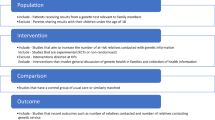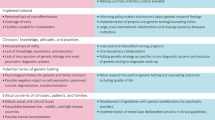Abstract
Genetics can pose special challenges to the principle of confidentiality within the health professional–patient relationship, since genetic information is by its nature both individual and familial. Most professional guidelines allow confidentiality to be broken in rare circumstances, where it will prevent a ‘serious’, ‘imminent’ and ‘likely’ harm. We argue that the types of harms that may result from genetic medicine are particularly diverse. Using clinical examples, we explore ethical issues that arise when balancing individual and family member interests. As genetic testing becomes more, widespread situations will arise where clinicians are faced with a choice between preserving the confidentiality of one patient and preventing harm to another. Professionals need to incorporate the notion of familial implications in their counseling of individuals. Since such dilemmas have been relatively rare in the pre-genetic age, we call for a wider debate on the balance between confidentiality and harm to others.
Similar content being viewed by others
Log in or create a free account to read this content
Gain free access to this article, as well as selected content from this journal and more on nature.com
or
References
Human Genetics Commission. Inside Information. Balancing interests in the use of personal genetic data; 1-5-2002.
Human Genetics: Choice and Responsibility. New York, NY: Oxford University Press; 1998.
Genetic Interest Group. Confidentiality guidelines, 1998; www.gig.org.uk (accessed 9/2002).
Knoppers B, Strom C, Wright-Clayton E et al. Professional disclosure of familial genetic information. Am J Hum Genet 1998; 62A: 474–483.
General Medical Council: Confidentiality: protecting providing information. Duties of a Doctor 2000.
W v Egdell, 1 All ER 855, 1990.
Tarasoff v Regents of University of CA, 551 P2d 334 (CA, 1976).
Pate v Threlkel, 661 So2d. 278 (FL, 1995) and Safer v Pack, 677 A. 2d 1188, 683 A 2d 1163 (NJ, 1996).
House of Commons Select Committee on Science and Technology: Human Genetics: The Science and its Consequences. Report No. 3 London: HMSO, 1995.
Julian-Reynier C, Eisinger F, Chabal F et al Disclosure to the family of breast/ovarian cancer genetic test results: patient's willingness associated factors. Am J Med Genet 94: 13.
Sommerville A, English V : Genetic privacy: orthodoxy or oxymoron? J Med Ethics 1999; 25: 144–150.
Knoppers BM, Hirtle M, Lormeau S, Laberge CM, Laflamme M : Control of DNA samples. Inform Genom 50: 385–401.
Nuffield Council on Bioethics. Genetic Screening, Ethical Issues, 1993; www.nuffieldbioethics.org/pubs.
Claes E, Evers-Kiebooms G, Boogaerts A, Decruyenaere M, Denayer L, Legius E : Communication with close and distant relatives in the context of genetic testing for hereditary breast and ovarian cancer in cancer patients. Am J Med Genet 2003; 116: 11–19.
Weijer C : Benefit-sharing and other protections for communities in genetic research. Clin Genet 2000; 58: 367–368.
Leung WC, Mariman EC, van der Wouden JC, van Amergongen H, Weijer C : Results of genetic testing: when confidentiality conflicts with a duty to warn relatives. Br Med J 2000; 321: 1464–1466.
Doukas DJ : Autonomy beneficence in the family: describing the family covenant. J Clin Ethics 1991; 2: 145–148.
Doukas DJ, Berg JW : The family covenant genetic testing. Am J Bioethics 2001; 1: 2–10.
Knoppers BM : Genetic information and the family: are we our brother's keeper? Trends Biotechnol 2002; 20: 85–86.
Parker M, Lucassen A : Concern for families and individuals in clinical genetics. J Med Ethics 2003; 29: 70–73.
Lucassen AM, Houlston RS : Clinical geneticists' attitudes and practice towards testing for breast cancer susceptibility genes. J Med Genet 2000; 37: 157–160.
Parker M, Lucassen A : Lancet 2002; 360: 1685–1688.
http://www.clingensoc.org/Ethics/genethics_club.htm (accessed 7/03).
Author information
Authors and Affiliations
Corresponding author
Rights and permissions
About this article
Cite this article
Lucassen, A., Parker, M. Confidentiality and serious harm in genetics – preserving the confidentiality of one patient and preventing harm to relatives. Eur J Hum Genet 12, 93–97 (2004). https://doi.org/10.1038/sj.ejhg.5201118
Received:
Revised:
Accepted:
Published:
Issue date:
DOI: https://doi.org/10.1038/sj.ejhg.5201118
Keywords
This article is cited by
-
A Relational Approach to Genetic Counseling for Hereditary Breast and Ovarian Cancer
Journal of Genetic Counseling (2017)
-
Neuroethics, confidentiality, and a cultural imperative in early onset Alzheimer disease: a case study with a First Nation population
Philosophy, Ethics, and Humanities in Medicine (2013)
-
The Risks of Absolute Medical Confidentiality
Science and Engineering Ethics (2013)
-
Enhancing Family Communication About Genetics: Ethical and Professional Dilemmas
Journal of Genetic Counseling (2013)
-
Guidelines for Disclosing Genetic Information to Family Members: From Development to Use
Familial Cancer (2006)



